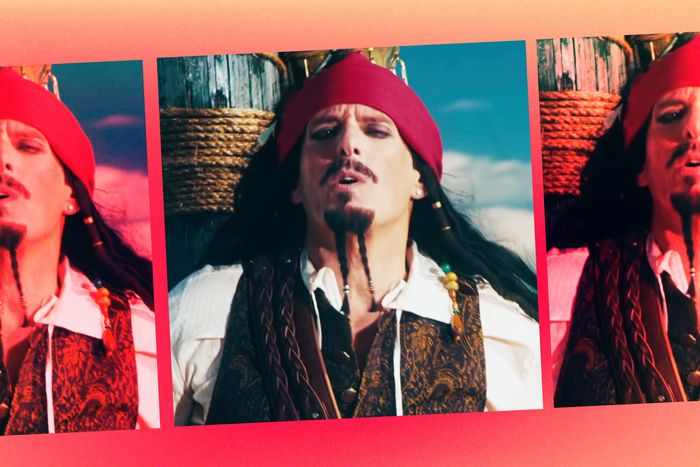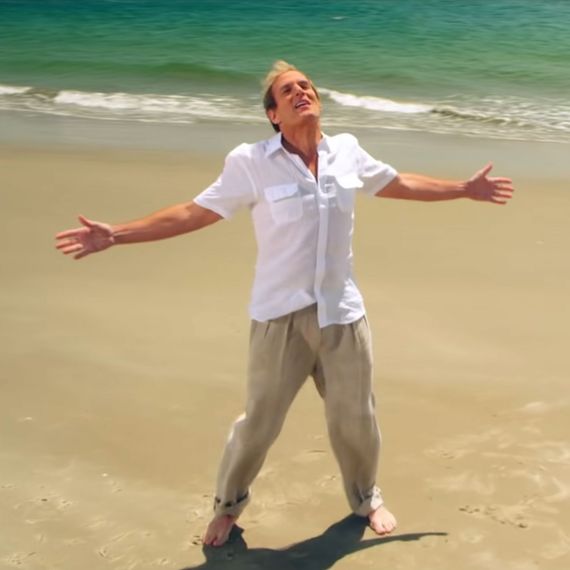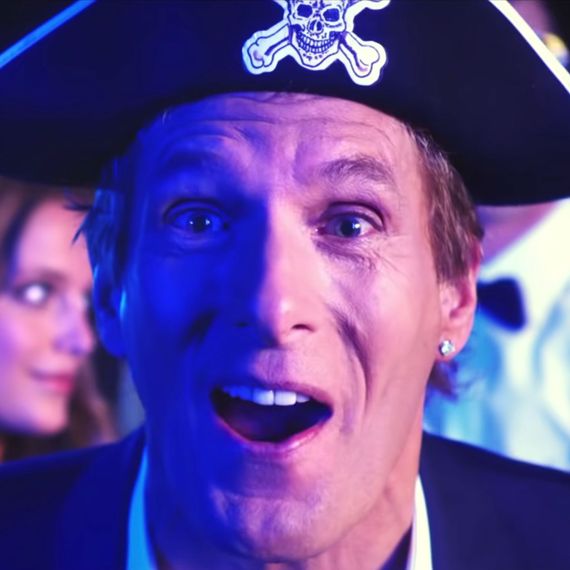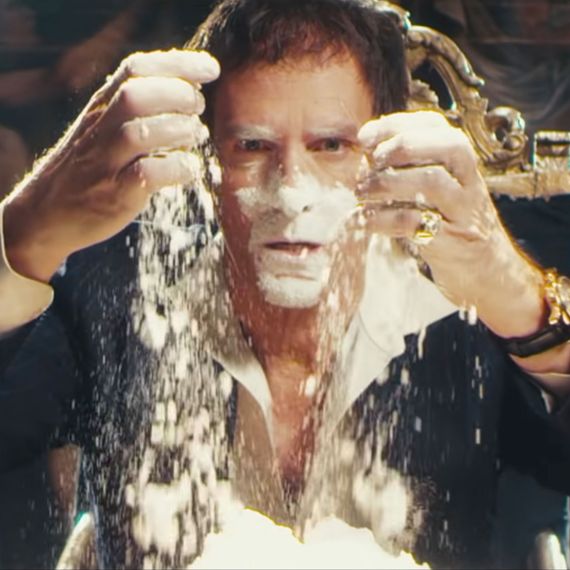
This is the tale of a brave balladeer who took a mystical quest to the Lonely Island and sailed away with what might be the biggest hit of his career. Yes, of course, it’s Michael Bolton and “Jack Sparrow.”
Let’s rewind back to May 2011, when SNL Digital Shorts were being traded around the internet like casefuls of pilfered doubloons. Sandwiched between Helen Mirren’s Magical Bosom and a 3-Way with Justin Timberlake, Bolton — the face and follicles of the adult-contemporary genre as we know it — jumped ship from his straightlaced persona to croon about his flourishing obsession with the Pirates of the Caribbean franchise. The setup is simple: Andy Samberg, Jorma Taccone, and Akiva Schaffer enlist him to contribute vocals and a “big, sexy hook” for their song about hitting the clubs, but Bolton would much rather sing about the cinematic joys of Davy Jones and giant squids. And the pauper of the surf and the jester of Tortuga. Oh, and if you ask him to focus up? He’ll insist on listing all his favorite films like a proto-Letterboxd user. “It was so much fun from start to finish,” Bolton recalls. “There wasn’t a time when anyone was looking at their watches or the clocks. There wasn’t a time when anyone was whining or complaining about how late the days were running.”
Getting to that finish line, though, took a lot of patience. Bolton and the trio went back and forth for several months trading lyrical ideas for Bolton’s approval, and many drafts — all of which were much, much more lewd than the final product — were discarded to more appropriately suit his image. At times, Bolton even felt “Jack Sparrow” might not come to fruition at all. And yet it did, culminating in a two-day music-video shoot in Brighton Beach. “I haven’t thought of this story in quite some time,” he now says, “but it’s pretty amazing how it started and came together.”
How did the Lonely Island present this idea to you? I’m curious about the pitch itself and why you were their top choice, since “Jack Sparrow” transcends the song. The visual component is just as important, if not more so.
A phone call came in, and they said they wanted to have a meeting. I loved what they’d done, and I wanted to be a part of the list of artists who worked with them. I soon found myself in a conference room at a hotel in Los Angeles — my manager and me on one side of the table, and Akiva, Jorma, and Andy sitting across from us. I said, “My daughters are so excited about me having this meeting with you guys.” And they said, “Our moms are so excited about us having this meeting with you.” So they pitched “Jack Sparrow” to me. The pitch was undoable. It was beyond vulgar.
That’s a high mark to hit as the starting point.
Whatever you’re thinking, it was more vulgar than that. Even though I understood what was funny about it, I thought I could be insulting the first ten rows of my live audience if I said “yes.” I was playing at the Vatican, you know what I mean? So the guys said, “We’ve had other people who worked with us who had concerns like this, and we’ve worked it out. We can tweak it. We’ll send you different ideas, and hopefully we can do something that will work for both of us. We don’t want anyone else.” I was really excited. I knew how busy they were. They’re all directors and producers as well as stars. I thought they were being nice, but within a week or so, I got the tweaked treatment and they made it even worse. They just went to some dark places.
How dark are we talking about?
With some of the language in the pitch, I felt like, I’d love to do this, but I have this audience that I’ve been fortunate enough to build through the years and they come to the shows to hear the greatest hits. Songs they had families to and grew up to. You have to understand why I can’t sing these lyrics. They said, “Okay, well, we’ll go at it again.” At this point, I thought they were pulling me along. I didn’t know how likely it was that we would be doing anything together. But they got back to me with another version a few months later that was heading in the right direction.
I happened to be performing in Atlanta while on tour, and I got this email from Andy. It’s always a fun moment when you look down and see that someone you love has sent you a message, but it’s surreal when it’s Andy Samberg and you know why he’s contacting you. I responded, “I read the newest treatment and I think I can do it. But I need to be in character when I do any lines as Al Pacino’s character from Scarface.” They said, “That’s not a problem. Can you get to a studio?” I responded, “Yeah, there’s tons of great studios in the city.” We were recording in no time, with them guiding me over Skype for a few hours. When you work with the Lonely Island guys, you have fun from the start and not just until the finish. I call it the gift that keeps on giving.
What has that gift looked like through the years?
I’ve been really, really busy. A lot of doors suddenly started opening after the “Jack Sparrow” video went viral. I remember John Mayer was at the Saturday Night Live after-party the night it aired, and he said to me, “Tomorrow you’re going to see something you’ve never seen before. People are going to love this, and they’re not going to be expecting it from you, so it may even be bigger.” I responded, “I hope you’re right.” I was sitting in the corner, almost hiding, just in case it didn’t go over well.
The next day, I came downstairs and my daughter was at the kitchen table with a computer open. She looked up at me, and I’ve never seen that look on her face before. She said, “Dad, you’re not going to believe what’s going on.” I said, “Just tell me it’s good.” She said, “They love it. They just love this.” She started reading me quotes, and Justin Bieber wrote, “Michael Bolton is a beast, you’ve got to see this.” How does he know who I am? I started to understand what John Mayer was talking about. It taught me something important: Have freakin’ fun.
Did you feel it was a requirement to maintain that “serious” perception within your genre, even if your own personality wasn’t as rigid?
I’d say so. You look for other ways to express yourself and build upon the core audience. Once you know it can happen, it piques your interest to find out what you could do next. “Jack Sparrow” made new friends and allies for me. We started pitching shows to networks and streaming partners.
Here’s a good example: After “Jack Sparrow,” I did a couple of episodes of Two and a Half Men. When we were filming and rehearsing, one of the characters had a line that wasn’t funny. I was walking down the stairs in Ashton Kutcher’s character’s house, and his mother comes down after me and says, “Oh, my. I’ve never had an adult-contemporary artist in my house before.” The room was quiet. No response at all. So when we finished for the day, I went to one of the writers and apologized for putting my two cents in. One of the writers said to me, “No, this is what we do. What’s bothering you?” I said, “The adult-contemporary line sounded a bit flat when we rehearsed it. I’m wondering if you could tweak that line.” The next day, when the actor was coming down the stairs during rehearsal, she saw me and said, “Oh, my. I have a vibrator named after you.” Everyone in the place stopped and broke out into laughter.
Oh, that’s an excellent change.
I loved it. I learned a couple of things, and one of them is to trust your instincts. If asked respectfully, you shouldn’t be intimidated or feel bad about offering up a possibility that a different line could make a better moment. I realized I could have all kinds of fun making music and making comedy. It was all possible. It sounds simple, but this sort of thing never crossed my mind before.




It’s an interesting case study to understand the difference between what the Lonely Island saw you bringing to them, and what you thought you were contributing in return. Did you view this as a negotiation as much as a collaboration?
Collaboration is ongoing from the second you sign on. It then becomes all about the script, the script, the script. For me, everything they asked made perfect sense, and there was a certain amount of innate wisdom these guys have that I thought was hilarious. Since then, when Akiva or Jorma or Andy calls, it’s like one of your best friends is on the phone, and there’s nothing but love and respect and curiosity about what they’re working on and how we’re going to work together again. So I don’t know if there’s a difference between negotiation and collaboration when you’ve already agreed and you’re basically saying, “Use me to make this next project happen.”
“Jack Sparrow” premiered in 2011, and, in a nice coincidence, you released an album of duets a few weeks later. What did you observe about yourself within the music industry during this time period, especially in relation to the adult-contemporary genre?
I always loved comedy pretty much all my life, but I spent a lot of years taking myself and my career a little too seriously. I realized I needed to start having fun. This has happened with most of the artists that I know — you get to a point where you’re relegated to whatever the perception of “adult contemporary” is.
Was there professional jealousy from any of your peers?
The answer is “yes,” but I won’t give you any names. I had some friends … well, I don’t think anything bordered on jealousy on a super-high level. But they were thinking, “Why aren’t I doing this for my career? What’s my manager doing for me?” They were nice about it, but there was definitely a sliver of that jealousy, and it was easy to spot. I recommended that they do what they can in any way possible to work with the Lonely Island guys. It would be really wise for their careers.
You were reluctant in 2011 to share the lyrics you deemed too nasty and vile to sing. In the spirit of the passage of time, could you reveal a few of them now?
I don’t think it would have the same power in a different context. But I remember the intention quite clearly. They were basically testing the water to see what they could get me to do. Total shock and awe. It was, to a larger extent, if they could get me to sing lines of lyrics that were sexually driven and aimed at my audience. We wound up surpassing the original goal of it. The life it took on. Man, it was my happy place.
So how did “this whole town’s a pussy just waiting to get fucked” get your approval?
It’s a quote from Scarface, and I said I’d only sing it dressed like Scarface himself. That was my condition.
What’s the one lyric that always makes you laugh?
“Now back to the good part.” Every time.
You’ve said you were hoping to speak to Al Pacino about the Scarface homage to see if he liked it. Did you ever get your answer?
I never did. A few years ago, I was leaving a restaurant where a lot of people in the business dine in Los Angeles, and I saw Al sitting by himself at a table. I was torn between leaving him alone to enjoy his lunch or approaching him to gush about how much of a fan I am. He’s always been very friendly to me in the past. I certainly hope I didn’t impair a positive relationship. I really believe he knows that I’m a huge fan of his, and my bet is that he approves.
Was there ever a discussion about doing a sequel song?
There’s always a continuing search for something that would be wise and worthy rather than doing something because we already did it. There’s a fan base out there. You wouldn’t have to twist my arm. Matter of fact, I’ll mention to them that you suggested it to me during this interview.
Well, Santana and Rob Thomas took 22 years to do their follow-up to “Smooth.”
Wow, okay. That’s a long time. I’d rather not wait that long. Let’s say five years.
What do you consider to be the biggest and sexiest hook in your discography?
It might be “Said I Loved You … But I Lied.” It’s a song I wrote with Mutt Lange. It’s one of my favorite songs to perform. There’s just something about its feeling. It’s spiritually intoxicating. Is there such a thing as that?
That sounds much cooler than “sexy.”
The critic has chimed in!
More From The Roll Call Series
- Amy Irving Answers Every Question We Have About Crossing Delancey
- Patrick Fischler Answers Every Question We Have About Mulholland Drive
- Nicholas Guest Answers Every Question We Have About Christmas Vacation


